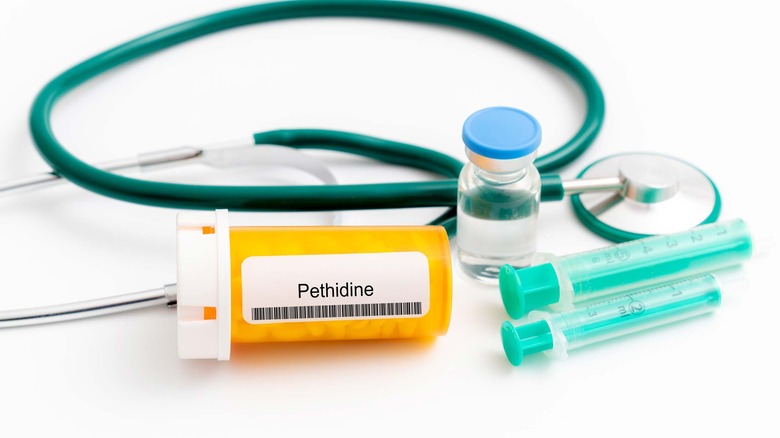Inside Harold Shipman's Drug Abuse History Before He Turned To Murder
Harold Shipman, also known as "Dr. Death" or "The Angel of Death," was one of the most notorious serial killers that England has ever seen (per BBC). The doctor was responsible for an estimated 218 patient deaths, and possibly many more, according to the Shipman Inquiry, a report of the investigation into Shipman.
According to BBC, Shipman was born in 1946 and grew up in Nottingham, England. During Shipman's formative years, he was influenced by doctors who cared for his beloved mother, Vera Shipman, as she was dying from cancer (per TruTV). He watched as the family doctor gave her morphine, which soothed her constant pain. After her death in 1963, when Shipman was just 17 years old, he was devastated — but he never forgot how the doctors treated his mom. The experience would go on to influence his entire career, starting long before Shipman ever began to murder his patients.
Early in Harold Shipman's career, the doctor worked in the Obstetrics and Gynecology wing of a medical center in Todmorden, according to the Shipman Inquiry. He started in 1973 and only worked there for about six months. But per The Guardian, Shipman's addiction grew, due to his depression and his easy access to pain medicine.
If you or anyone you know is struggling with addiction issues, help is available. Visit the Substance Abuse and Mental Health Services Administration website or contact SAMHSA's National Helpline at 1-800-662-HELP (4357).
Shipman stole pain medicine from patients in labor
The powerful painkiller pethidine is usually used when a person is giving birth, but during his six months in the OB/GYN wing of the medical center, Harold Shipman used the drug (via The Guardian). He routinely wrote prescriptions for patients that he would then fill for himself. Shipman would give some medicine to his patient, but keep the leftover pethidine, which he then injected into his arms or legs. Other times, he would take the entire pethidine dose, meant for someone who was in labor, and consume it himself. He prescribed doses large enough to raise the eyebrows of those around him.
By the end of his time on the OB/GYN ward, he was completely dependent on the substance, according to the Shipman Report. Shipman started to have blackouts, per TruTV, but he told his colleagues that epilepsy was to blame. His place of business had caught on to his habit of overprescribing drugs, and Shipman entered drug rehabilitation in 1975.
Shipman wasn't able to stay away from pethidine, according to The Guardian. In 1976, he was convicted on forgery charges — he had been writing forged prescriptions for huge doses of the drug again. The same year, Shipman got access to a dose of morphine strong enough to kill 360 people. Although he would inject some of the pain medicines into himself, he was also killing his patients with the same chemicals, causing diamorphine overdoses.
Constant access to drugs
Harold Shipman had a hard time staying clean when he had constant access to strong painkillers as a doctor (per TruTV). According to the Shipman Inquiry, he liked to play around with dosage amounts, especially on his oldest patients, just to see what would happen.
For one patient, who was incorrectly diagnosed with cancer, Shipman wrote enormous doses of morphine, encouraging the patient to take way more than was necessary, in order for Shipman to use some of the drug for himself. The patient's wife was so concerned about the dosage that she insisted Shipman stop giving her husband so much morphine, which possibly saved the patient's life. He later found out he never had cancer in the first place. This patient was another of Shipman's many mistreated victims.
While drug use doesn't explain Shipman's desire to kill, it did cause him to chronically overprescribe and mistreat his patients. The Guardian reports that after investigations into his practices, Shipman was given 15 life sentences. Per BBC, although Shipman died in jail in 2004, his horrific practices have led to "the Shipman effect," in which doctors are now more closely scrutinized while they work around medications with addictive properties.


